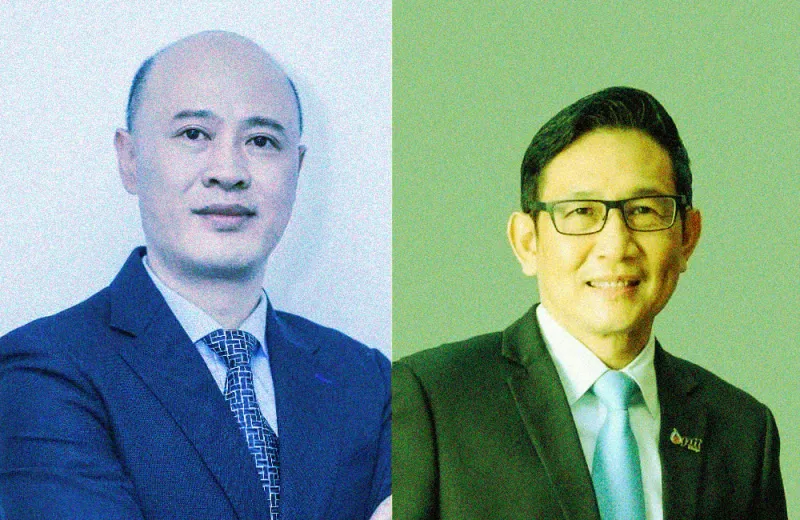Inflation, rising cost of living, and geopolitical tensions have prompted Asia’s top executives to take a more cautious approach.
Take Auttapol Rerkpiboon, the top-rated executive in the oil and gas sector in Institutional Investor’s 2022 All-Asia Executive Team. His company PTT is based in Thailand, where the rise in energy and food prices has driven inflation up to 7.1 percent year-on-year as of May 2022, the highest level in nearly 14 years. Rerkpiboon said that while PTT, a national petroleum exploration and production company, is looking for new markets, the challenge of inflation means they are studying potential new projects more thoroughly before going ahead “to ensure that the investment will yield appropriate return at appropriate time and also fit to long-term strategy.” The firm is seeking “more opportunities in both domestic and overseas [markets] while the energy market is [in] an uptrend,” Rerkpiboon told II.
Likewise Hongbin Zhou, the top-rated chief executive in the property sector, said that his company is taking a more “intelligent” approach to investing, improving efficiency as they try to grow the company to ten times its current size in just five years. Zhou heads up property management company CIFI Ever Sunshine Services, which manages residential and non-residential properties, including sales assistance, housing repair, and pre-delivery inspection across China. Increasing labor costs are the main risk from inflation, Zhou said, as the business is in the service industry. “Regarding that, we think the increase of staff wages each period is fair and reasonable,” Zhou said. “Nevertheless, due to the weak macro-economic environment as well as Covid-19, the increasing unemployment rate increased supply in the labor market, relieving increases in wages in the short term.”
Zhou is more concerned by the Chinese government’s crackdown on speculation in the property market, which analysts say will benefit property management companies at the expense of developers. “The reshuffle in [the] real estate industry will indeed challenge the independence of [property management services],” Zhou said. “As for us, Cifi and Ever Sunshine [have always been] two independent listed companies with independent corporate governance and compliance.”
For Rerkpiboon, it’s the energy crisis that’s keeping him up at night. “PTT, as a national oil company, has played an important role to ensure supply for Thailand’s energy security, stabilize the volatility of energy prices, and drive national economic growth,” he said. PTT is prepared to increase both crude and refined oil supplies as needed, Rerkpiboon said, coordinating with international partners to secure more crude oil than normal.
Nonetheless, the company is rapidly diversifying, with investments in cleaner energy sources, infrastructure for electric cars, pharmaceuticals, and peer-to-peer energy trading using blockchain. “Energy crises in the past as well as a significant increase in energy prices are the key factors for businesses to reduce dependence on fossil fuels and accelerate the clean energy transition,” Rerkpiboon said. “Oil and gas companies worldwide, including PTT, have to adjust their strategies [to] adapt to changes.”
Auttapol Rerkpiboon, PTT
To what extent is price inflation an issue for your business, and how are you preparing?
Thailand inflation jumped to 7.1 percent year on year in May 2022, the highest level in nearly 14 years, largely due to the rise in energy and food prices, as well as low base effect from last year. In addition, Thai Baht depreciation has pushed [up costs] for feedstock and materials for some products whose purchasing price is related to the US dollar. In terms of investment decisions, price inflation has led to rising interest rates globally which affects the higher financial cost for projects both domestic and international and also, the premium to acquire projects such as the Gas/LNG Project [the construction of a gas receiving terminal].PTT Group is well prepared for the situation with the following measures: managing cost and controlling operating expenses; mitigating risks of exposure to volatile foreign currencies by FX hedging; seeking more opportunities in both domestic and overseas [markets] while the energy market is an uptrend; and providing assistance to customers in order to maintain loyalty in the long-term, such as prolonging credit terms and give some discount.
To what extent are geopolitical tensions affecting your business?
Geopolitical tensions in Russia-Ukraine have affected energy prices. Thailand is a net importer of oil and gas, importing 92 percent of crude oil and 17 percent of [liquefied natural gas]. The increase in energy prices has driven up production costs and nationwide basic cost of living. PTT's business operations are not directly affected by the situation, as PTT hasn’t imported much crude oil from Russia (no more than 5 percent in 2021 and none in 2022), but [it is] indirectly affected by the rising of energy prices.In line with [our] new vision "Powering Life with Future Energy and Beyond”, PTT has adjusted our strategy to invest in clean energy both domestically and internationally through our affiliates in the sectors of renewables [and] energy storage to reduce dependence on fossil fuels. In addition, PTT has invested in electric vehicles. These clean and green businesses will help to support decarbonized society. Meanwhile, PTT has also expanded businesses beyond the energy industry, such as in life sciences, mobility, and lifestyle and AI, robotics, and digitalization.
What other headwinds are you preparing for?
Surging energy prices due to ongoing tensions in Russia-Ukraine have added pressure on the global economy’s recovery after Covid-19 pandemic. PTT, as a national oil company, has played an important role to ensure supply for Thailand’s energy security, stabilize the volatility of energy prices and drive national economic growth. PTT Group is prepared to increase both crude and refined oil supplies as needed. We coordinated with our refineries to maintain oil reserves at the highest level and cooperated with partners worldwide to secure crude oil more than normal level. We have also monitored the global energy market and executed price risk management when necessary in order to manage energy prices’ volatility.In response to energy transition and future trends, PTT Group has initiated and redesigned business models and investment portfolio following our new vision and strategic direction that’s moving toward cleaner energy and diversifying into new businesses. We are focusing on renewables, energy storage systems, and the EV value chain as well as developing new S-Curve businesses that drive people’s well-being. PTT Group has also expedited our investments to help stimulate Thailand’s economy.
How are you innovating?
PTT implemented new aspirations under the concept of “partnership and platform,” in which we focus on building partnerships and developing PTT’s business model to be a platform rather than a producer or a distributor of products. Since 2020, PTT has collaborated with many partners who are expertise in each area to develop new businesses. Also, we implemented organizational restructuring to allow more flexibility, efficiency, and speed. In addition, we are also focused on the development of personnel to support the transformation.PTT have also set our new targets that, by 2030, renewable capacity is set at 12 GW and 15 percent of greenhouse gas emissions will be reduced, aiming for net zero emissions.
How do you inspire loyalty in your workforce and maintain staff retention?
PTT fosters employees’ motivation in-term of remuneration, career path, and welfare. Remuneration is linked to individual performance and employees of all levels set their goals and targets at an individual level. The goals and targets must be aligned with business goals and strategy, while justly reflecting the different performance results among employees. Career path management creates employee readiness for promotion and moving up in the organization. The individual career development plan is prepared for high performance and development of employees that ensure their eligibility as candidates for internal vacancies. Welfare and other benefits offered by PTT are higher than legal requirements and are tailored to suit all age ranges.Every year, PTT reviews and develops key factors affecting employee engagement and satisfaction. The employee engagement and satisfaction surveys themselves to help us understand the needs and expectations of our diverse pools of people. Results from the assessment are then analyzed to improve how we approach building engagement and satisfaction, which in turn leads to key business outcomes. In 2021, although we were still [dealing with] Covid-19, PTT’s engagement score was in the top quartile across Asia and the Pacific and higher than the benchmark APAC best employer at 80 percent.







